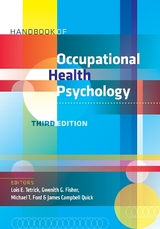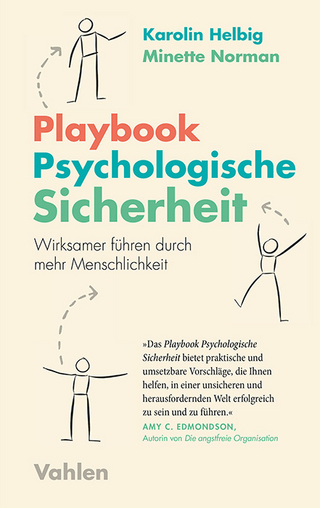
Handbook of Occupational Health Psychology
American Psychological Association (Verlag)
978-1-4338-0776-3 (ISBN)
- Titel erscheint in neuer Auflage
- Artikel merken
This second edition of the Handbook of Occupational Health Psychology reviews the history of OHP; theories and models; causes of work problems and risks; resulting symptoms and disorders; prevention, intervention, and treatment strategies used by practicing professionals; and methods of research and evaluation. The chapters have been updated since the first edition was published, and several new chapters address cross-cultural issues, leadership, pain and musculoskeletal conditions, substance abuse, and organizational justice.
With its comprehensive scope and interdisciplinary approach, this book will interest professionals from a range of specialties, including industrial and organizational psychology, human factors, social psychology, health psychology, clinical psychology, public health, preventive medicine, and industrial engineering.
James Campbell Quick, PhD, is John and Judy Goolsby Distinguished Professor, Goolsby Leadership Academy at the University of Texas at Arlington, and visiting professor, Lancaster University Management School, United Kingdom. He is a fellow of the Society for Industrial and Organizational Psychology, APA, and of the American Institute of Stress. He was awarded an APA presidential citation in 2001 and the 2002 Harry and Miriam Levinson Award by the American Psychological Foundation. He and his brother Jonathan originated preventive stress management, a term included in the 2007 APA Dictionary of Psychology. He has more than 100 publications in 10 languages and holds a 2009 University Award for Distinguished Record of Research. Colonel (Ret.) Quick was awarded the Legion of Merit by the United States Air Force and the Maroon Citation by Colgate University. He is married to the former Sheri Grimes Schember; both are members of the Chancellor's Council of the University of Texas System and the Silver Society, American Psychological Foundation. Lois E. Tetrick, PhD, received her doctorate in industrial and organizational psychology from the Georgia Institute of Technology in 1983. Upon completion of her doctoral studies, she joined the faculty of the Department of Psychology at Wayne State University and remained there until 1995, when she moved to the Department of Psychology at the University of Houston. She joined the faculty at George Mason University as the director of the Industrial and Organizational Psychology Program in 2003. Dr. Tetrick is editor of the Journal of Occupational Health Psychology. She coedited the first edition of the Handbook of Occupational Health Psychology with James Campbell Quick and Health and Safety in Organizations with David Hofmann. She also coedited The Employment Relationship: Examining Psychological and Contextual Perspectives with Jacqueline Coyle-Shapiro, Lynn Shore, and Susan Taylor. Dr. Tetrick is a fellow of the European Academy of Occupational Health Psychology, APA, the Society for Industrial and Organizational Psychology (SIOP), and the Association for Psychological Science. She served as president of SIOP (2007–2008), chair of the Human Resources Division of the Academy of Management (2001–2002), SIOP representative on the APA Council of Representatives (2003–2005), and member of the APA Board of Scientific Affairs (2006–2009). Her research interests are occupational health and safety, occupational stress, the work–family interface, and the psychological contracts and exchange relationships between employees and their organizations.
Contributors
Foreword: Narrowing the Science–Policy Gap
—Lennart Levi
Preface
I. Mission and History
Overview of Occupational Health Psychology: Public Health in Occupational Settings
—Lois E. Tetrick and James Campbell Quick
A History of Occupational Health Psychology
—Julian Barling and Amanda Griffiths
II. Models and Frameworks
Theories of Occupational Stress
—Daniel C. Ganster and Pamela L. Perrewé
Savoring Eustress While Coping With Distress: The Holistic Model of Stress
—Debra L. Nelson and Bret L. Simmons
Controlling Occupational Safety and Health Hazards
—Michael J. Smith and Pascale Carayon
An Integral Framework for Organizational Wellness: Core Technology, Practice Models, and Case Studies
—Joel B. Bennett, Royer F. Cook, and Kenneth R. Pelletier
Cross-Cultural Occupational Health Psychology
—Chu-Hsiang Chang and Paul E. Spector
III. Causes and Risks
Safety Climate: Conceptual and Measurement Issues
—Dov Zohar
Work–Family Balance: A Review and Extension of the Literature
—Jeffrey H. Greenhaus and Tammy D. Allen
Work Schedules, Health, and Safety
—Carlla S. Smith, Simon Folkard, Philip Tucker, and Michael S. Evans
The Impact of Organizational Justice on Occupational Health
—Russell Cropanzano and Thomas A. Wright
IV. Symptoms and Disorders
Job-Related Burnout: A Review of Major Research Foci and Challenges
—Arie Shirom
Workplace and Cardiovascular Disease: Relevance and Potential Role for Occupational Health Psychology
—Paul A. Landsbergis, Peter L. Schnall, Karen L. Belkic, Dean Baker, Joseph E. Schwartz, and Thomas G. Pickering
Pain, Musculoskeletal Injuries, and Return to Work
—Robert J. Gatchel and Nancy Kishino
Alcohol and Illicit Drug Use in the Workforce and Workplace
—Michael R. Frone
V. Interventions and Treatment
Job Stress Interventions and Organization of Work
—Norbert K. Semmer
Worksite Health Interventions: Targets for Change and Strategies for Attaining Them
—Catherine A. Heaney
Employee Assistance Programs: Strengths, Challenges, and Future Roles
—Cary L. Cooper, Philip D. Dewe, and Michael P. O'Driscoll
Occupational Health and Safety Leadership
—Jane Mullen and E. Kevin Kelloway
IV. Methodology and Evaluation
An Epidemiological Perspective on Research Design, Measurement, and Surveillance Strategies
—Stanislav V. Kasl and Beth A. Jones
Program Evaluation: The Bottom Line in Organizational Health
—Joyce A. Adkins, Susan Douglas Kelley, Leonard Bickman, and Howard M. Weiss
Index
About the Editors
| Erscheint lt. Verlag | 30.9.2010 |
|---|---|
| Verlagsort | Washington DC |
| Sprache | englisch |
| Maße | 178 x 254 mm |
| Themenwelt | Geisteswissenschaften ► Psychologie ► Arbeits- und Organisationspsychologie |
| Geisteswissenschaften ► Psychologie ► Klinische Psychologie | |
| ISBN-10 | 1-4338-0776-9 / 1433807769 |
| ISBN-13 | 978-1-4338-0776-3 / 9781433807763 |
| Zustand | Neuware |
| Informationen gemäß Produktsicherheitsverordnung (GPSR) | |
| Haben Sie eine Frage zum Produkt? |
aus dem Bereich



